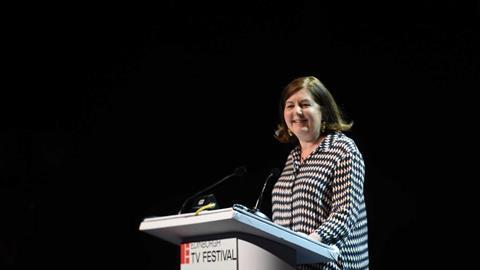Edinburgh offered reminder of the value of face-to-face discussion
The Edinburgh TV Festival was a welcome reminder of the value of a frank exchange of views, face-to-face conversation, and good old-fashioned listening.
This was in no small part thanks to Dorothy Byrne’s cracking MacTaggart Lecture, which blended the intensely personal (menopause and sexual assault) with the overwhelmingly public (branding Britain’s two most senior politicians cowards for ducking scrutiny). Four days later, Boris Johnson declined to take part in a scheduled Channel 4 News interview – you couldn’t make it up.
Byrne’s lecture challenged the industry as well as the political class. She told her peers and colleagues to stop the “ghastly” practice of invariably agreeing with their bosses, and chided them for creating programmes that only “say small or medium-sized things about society”, rather than the greater ambition habitually demonstrated in books, TED Talks and podcasts.
She deserved her standing ovation, but didn’t shy away from being challenged, either. I asked her why, as the boss of Channel 4 news and current affairs, she had she not ordered precisely the type of programmes she claims are so badly missing?
“I attack myself as well, I can’t just hide behind my bosses,” she said. “People tell me that these stories [big societal issues such as climate change] can be told through formats, and I just don’t believe they can. But if I attack others, I have to take responsibility as well.”
“Jeff Brazier gave the duty of care debate a human face and eloquently urged the industry to show empathy to its contributors”
That sort of openness was also in evidence from the diverse viewpoints of political writer James Graham and former reality star Jeff Brazier. Graham sparred with Alistair Campbell and refused to accept that dramatising Brexit and boosting Dominic Cummings’ personal profile was irresponsible.
He spoke of getting access to Cummings, despite the latter refusing journalistic interviews or to be scrutinised by a parliamentary committee.
“For whatever reason, he spoke to a playwright. He told me things he hadn’t told anyone else – which is I why I fight for drama’s seat at the table.”
Meanwhile, Brazier gave the duty of care debate a human face and eloquently urged the industry to show empathy to its contributors.
“You might feel eight counselling sessions provides adequate support to someone who has struggled with a particular issue, but a few months later, their mental health might dip again. If anything happens… the finger of blame still points your way.”

But Brazier wasn’t accusatory, and instead urged the industry to do all it can to support vulnerable contributors, rather than to stop casting them.
His view chimes with that of many producers and controllers, but was much more powerful coming from someone with his personal history. Duty of care is a debate for the industry, but real life for programme contributors.
- Chris Curtis is the editor in chief of Broadcast






No comments yet